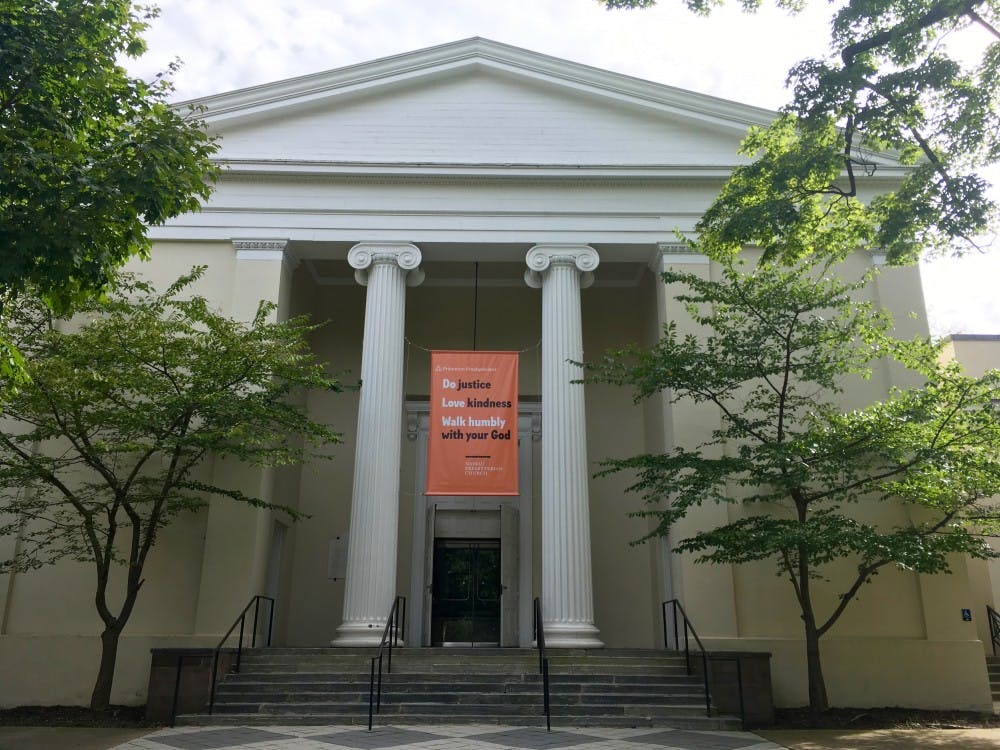After a busy and exciting sorority recruitment week last week, 57 percent of students who began the rush process received a bid from one of the University’s three sororities, and 53 percent of students who began the rush process chose to accept a bid and join a sorority.
On the final night, 65 students preferenced “Pi Phi” as their first choice, 57 preferenced “Theta” as their first choice, and 38 preferenced “Kappa” as their first choice.

According to Panhellenic Council President Emily Erdos ’19, this year’s rush resulted in 49 new bids to Kappa Alpha Theta, 50 new bids to Pi Beta Phi, and 47 new bids to Kappa Kappa Gamma.
Erdos is the Head Opinion Editor for The Daily Princetonian.
Sororities make cuts after every night of recruitment, with potential new members learning which “party sessions” they have been invited back to shortly before each night of recruitment begins. Of the girls who received invitations to Pi Phi's final night of recruitment, 77 percent received bids from Pi Phi. Meanwhile, 86 percent of those selected to continue to Theta’s final party received bids from Theta, while Kappa's post-preference night acceptance rate was 100 percent this fall.

All bids to “Theta” and “Pi Phi” were accepted, while 38 of the 47 bids to “Kappa” were accepted.
This year, for each sorority, there is a quota of 47 bids. Quota is determined annually by Panhellenic.
This is the first year that Kappa made the bid quota, offering 47 bids to rush participants.


New members of Kappa Kappa Gamma pose for a picture on Bid Day at Blair Arch this month.
Courtesy of Princeton Kappa Kappa Gamma Facebook.
Two-hundred-fifty-five undergraduate women participated in sorority recruitment this year, an unusually high number.
“I honestly didn’t realize how popular [rush] was,” Amy Watsky ’21, now a new member of Theta said. “I really was not nervous at all until I got there in Frist Campus Center and literally the entire hallway was filled with girls.”

New members of Kappa Alpha Theta pose for Bid Day at Blair Arch this month.
Courtesy of Catherine Benedict.
According to Erdos, last year the number was 214, and the year before was below 200.
Edros and other sorority members interviewed said that the high interest in rushing speaks to the University’s need for a fourth sorority. Until Kappa’s membership reaches 124, however, another sorority can’t be added to the University community.
“It would be great if there was another sorority,” Angela Weng ’21, also a new member of Theta, said. “It’s great to have another option.”
Currently, Theta’s total membership sits at 138, Pi Phi’s at 146, and Kappa’s at 88.
No sororities or fraternities on campus are recognized by the University, but they are nevertheless a big part of social life for many undergraduate students.
Rush is a mutual-selection process in which final bids are determined by both the preference of the student rushing and the sororities themselves. On the first night of the sorority rush process, “potential new members” attend parties at all three sororities. The second night, girls are invited back and can attend all three sorority’s events. The third night girls are invited back again to attend up to two sorority events. That night, students list their preferences if they are invited back to more than one sorority.
“You get to meet a lot of people in your class and a lot of upperclassmen and form connections. You know more people regardless of whether or not you join a sorority” Coco Wallace ’21, a new member of Pi Phi, said.
Of the original 255 registered, 176 were invited to and attended the final night of rush.
According to Erdos, she and the sororities recommend that students maximize their options on the final night. Even if there is only one sorority that the student is interested in, it is still advantageous to list another sorority in second place, Erdos explained.
Since there is no guarantee that a student gets a bid, putting only one sorority down, or “single-preferencing,” makes it less likely for one to become a quota addition, Erdos said.
Fourteen people this year “single-preferenced” on the final night and did not make any sorority’s respective cutoff, meaning they didn’t receive a bid.
Students reported that the rush experience did away with the stereotypes they had about sororities, and reported feeling welcomed by many upperclassmen. Before the rush process, students thought that sororities would be overly competitive and exclusive.
“Princeton’s rush destroyed some of the preconceived notions I had about sororities and rush that are perpetuated in the media,” Grace Chen ’21, a new member of Kappa, said.
Overall, members of the Class of 2020 and 2021 who joined sororities last week said they don’t know what’s in store, and that they just enjoyed the opportunity to meet new people. They said they look forward to furthering their new friendships in coming semesters.








